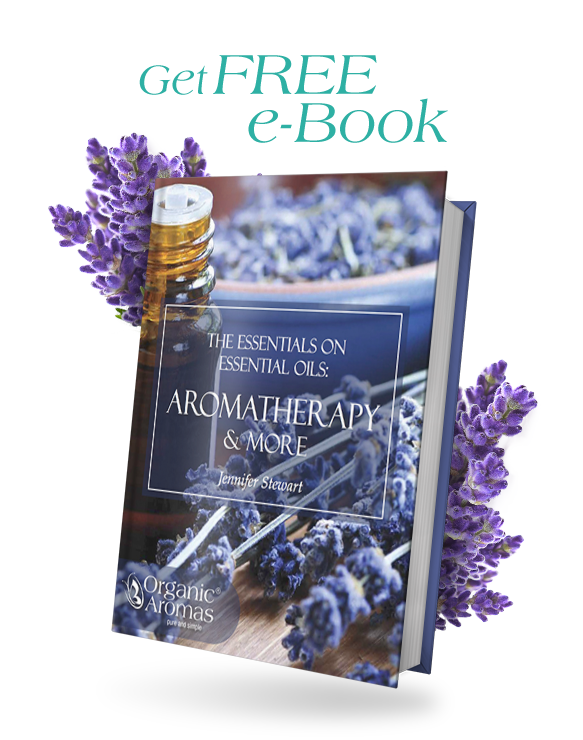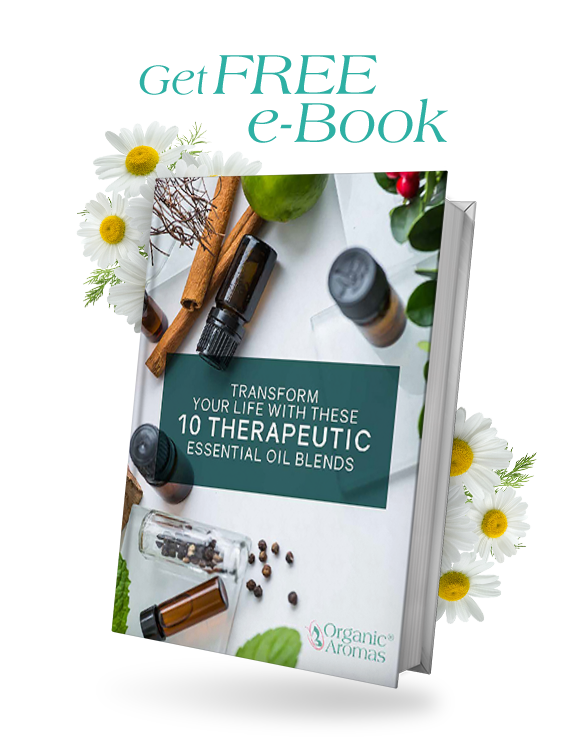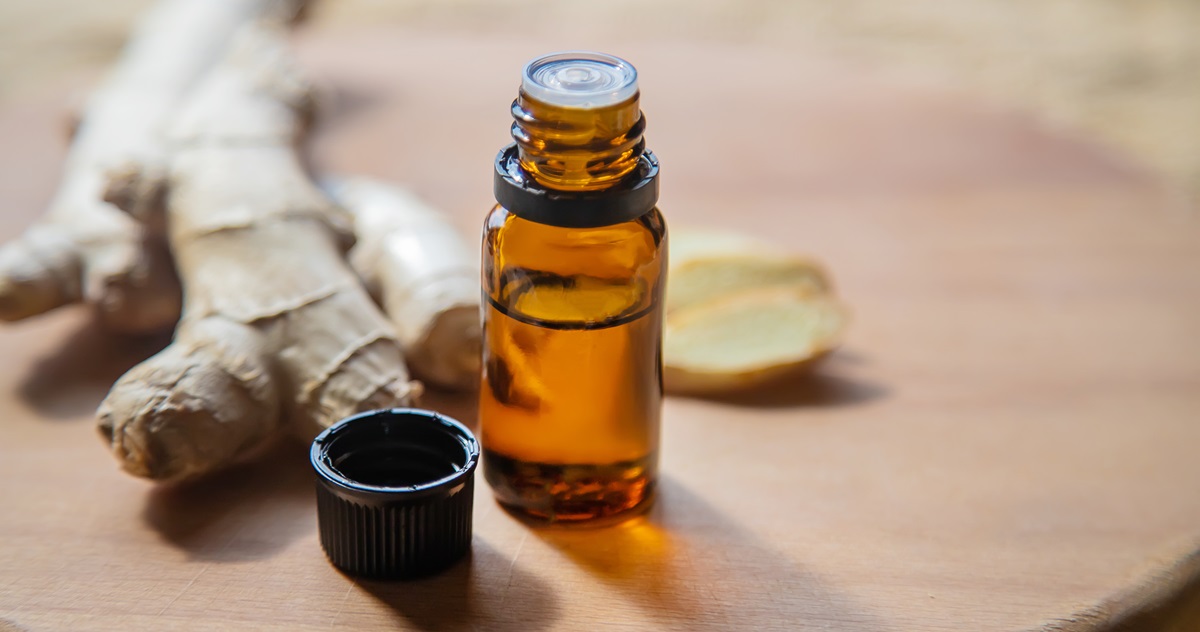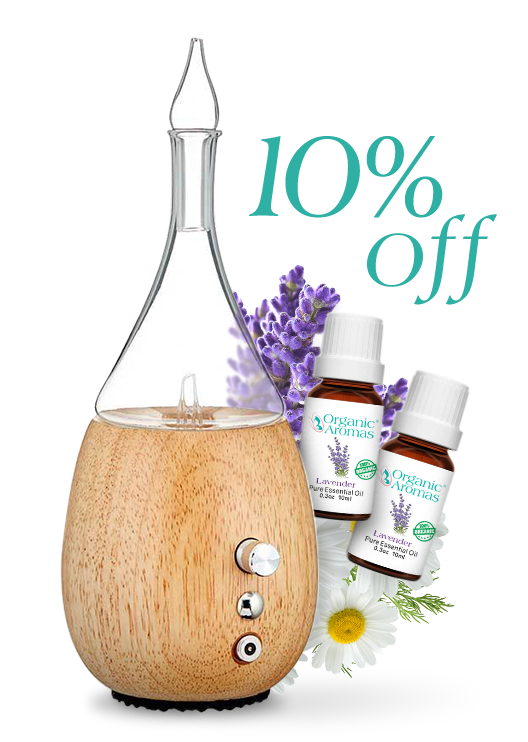Top 10 Essential Oils For Swelling and Inflammation
Inflammation plays a crucial role in your body’s natural immune response. After an injury or infection, when inflammation occurs your immune system reacts by increasing blood flow to the affected area, delivering white blood cells to promote healing. However, inflammation also causes redness, swelling, and soreness. While mild inflammation may last only a few days or weeks, chronic inflammation, often due to autoimmune disorders, can persist and lead to significant discomfort.
There are many ways to manage inflammation, including conventional medication. However, you might consider a more natural way using essential oils, known for their anti inflammatory properties. This article explores how essential oils for swelling and inflammation can benefit different parts of the body, from skin to joints and muscles. This guide will inform you about the best essential oils to use depending on where the inflammation has occurred.
The Science of Essential Oils for Inflammation

Inflammation occurs when your body’s immune system responds to harmful stimuli such as pathogens, damaged cells, or irritants. Factors like infections, injuries, and exposure to toxins promote inflammation by triggering an immune response. During this process, immune cells release chemicals that increase blood flow to the affected area, causing redness, warmth, swelling, and pain as the body works to isolate and eliminate the harmful stimuli. However, prolonged inflammation can lead to tissue damage and contribute to various chronic diseases.
Essential oils contain various active compounds that exhibit significant anti-inflammatory properties. These compounds work through multiple mechanisms to reduce inflammation and promote healing. Here are some key components and their actions:
- Linalyl Acetate: This compound helps reduce inflammation by modulating the body’s immune response and decreasing the production of inflammatory markers.
- Bisabolol and Chamazulene: These compounds penetrate deep into the skin, providing relief from inflammation by inhibiting the production of inflammatory cytokines.
- Menthol: Menthol provides a cooling effect and reduces inflammation by constricting blood vessels and counteracting the action of inflammatory cells.
- Carvacrol: Carvacrol is known for its ability to inhibit the enzyme COX-2, which plays a crucial role in the inflammatory process.
- Eucalyptol: Eucalyptol reduces respiratory inflammation by opening up airways and decreasing the production of inflammatory mediators.
These components physically interact with inflammatory pathways by reducing the expression of inflammatory genes, inhibiting the production of pro-inflammatory enzymes, and promoting the release of anti-inflammatory compounds. This multi-faceted approach helps in managing and reducing inflammation effectively.

Sign Up to Get Your FREE
e-Book Here…
Evidence from Scientific Studies
Skin Inflammation A study on the anti-inflammatory effects of German Chamomile essential oil found that bisabolol and chamazulene significantly reduced skin inflammation by inhibiting cytokine production, thus providing relief from conditions such as eczema and dermatitis1.
Muscle Inflammation Research on rosemary essential oil demonstrated its effectiveness in reducing muscle inflammation and pain. The study showed that the oil increases blood flow and enhances the body’s natural healing processes, providing relief from sore and inflamed muscles2.
Respiratory Inflammation Aniseed essential oil was shown to reduce respiratory inflammation by decreasing the levels of pro-inflammatory cytokines IL-1 and IL-8. The study concluded that aniseed essential oil could be beneficial in treating respiratory disorders like bronchitis3.
Oral Inflammation A clinical trial investigating the use of a sage-containing mouthwash found that it reduced gingival inflammation and plaque indices, demonstrating the potential of essential oils in managing oral health and reducing inflammation in the gums4.
Best Essential Oils for Skin Inflammation

Skin inflammation can result from exposure to various toxins, causing red and irritated skin. Here are the best essential oils for managing skin inflammation:
- Clary Sage
- Active Compound: Linalyl acetate
- Benefits: This potent anti inflammatory compound slows inflammation and boosts natural healing in the body. Clary sage oil also helps balance skin oil and promotes youthful skin. Consider using clary sage for skin inflammation to achieve noticeable improvements.
- German Chamomile
- Active Compounds: Bisabolol and chamazulene
- Benefits: German chamomile is rich in anti inflammatory properties. It penetrates deep into the skin layers, providing relief from rashes, sunburns, eczema, and other skin irritations.
- Lavender Oil
- Benefits: Known for its relaxation properties, lavender oil also has an anti inflammatory effect. It reduces redness and soothes irritated skin, making it ideal for treating skin inflammation.
- Tea Tree Oil
- Active Compound: Terpinen-4-ol
- Benefits: Tea tree oil has anti inflammatory properties and is effective against acne and skin infections. It helps reduce swelling and redness, promoting healthier skin.
- Frankincense Oil
- Active Compounds: Alpha-pinene and boswellic acids
- Benefits: Frankincense oil is renowned for its counter the harmful effects and ability to improve skin elasticity. It helps reduce inflammation and promote the regeneration of healthy skin cells.
How to Use Essential Oils for Skin Inflammation
To use these essential oils for skin inflammation, always dilute them with a carrier oil like coconut oil before applying them topically. This prevents skin irritation and enhances absorption. Apply just a few drops of the diluted oil to the affected area and gently massage it into the skin. A skin patch test is recommended to check for any allergic reactions following essential oils.

Sign Up to Get Your FREE Essential Oils e-Book Here
Best Essential Oils for Muscle Inflammation
Sore, inflamed muscles can result from excessive exercise, heavy lifting, or even aging. Here are the best essential oils for managing muscle inflammation:
- Rosemary Oil
- Active Compounds: Carnosic acid and rosmarinic acid
- Benefits: Rosemary oil works uniquely to help reduce inflammation by boosting blood flow and activating natural healing. Studies show that it increases white blood cells to the muscles, hastening recovery. This oil also provides pain relief and can ease inflammation effectively.
- Peppermint Oil
- Active Compounds: Menthol and menthone
- Benefits: Known for its cooling effect, peppermint oil is a pain reliever effective against acute inflammation. It reduces blood flow to counteract the action of white blood cells that trigger excessive inflammation, providing quick pain relief for tired, sore, and achy muscles.
- Thyme Oil
- Active Compound: Carvacrol
- Benefits: For muscle inflammation, thyme essential oil is a must-have. It reduces the enzyme COX-2, easing the effects of inflammation for quick relief. Thyme oil is also known for its anti inflammatory activity and is effective in reducing chronic joint inflammation.
- Sweet Marjoram Oil
- Active Compound: Carvacrol
- Benefits: Sweet marjoram oil is known for its potent antioxidant properties. It keeps oxidation, which leads to inflammation, in check, minimizing overall inflammation in your body. This oil has excellent anti inflammatory properties.
- Lavender Oil
- Active Compounds: Linalool and linalyl acetate
- Benefits: Lavender oil helps manage pain and swelling associated with inflammation. While known for its relaxation properties, studies have found lavender to be an excellent anti inflammatory agent. Topical application to the muscles provides significant relief and can help reduce muscle aches.
- Ginger Essential Oil
- Active Compounds: Gingerol and zingerone
- Benefits: Ginger essential oil has powerful anti inflammatory properties and is effective in reducing muscle pain and inflammation. It is particularly useful for conditions like rheumatoid arthritis and chronic joint pain.

How to Use Essential Oils for Muscle Inflammation
To use these essential oils for muscle inflammation, dilute them with a carrier oil such as coconut oil or almond oil. Apply just a few drops of the diluted mixture to the affected area and massage gently. This method helps relieve muscle pain and reduces swelling. You can also add a few drops to a warm bath to enhance muscle relaxation and reduce inflammation.
Best Essential Oils for Respiratory Inflammation
Respiratory inflammation can lead to symptoms such as difficulty breathing and congestion. Here are the best essential oils for managing respiratory inflammation:
- Eucalyptus Oil
- Active Compound: Eucalyptol (cineole)
- Benefits: Eucalyptus essential oil is well-regarded for its ability to open up airways and promote easy breathing. It has natural analgesic and anti inflammatory properties, reducing symptoms while sparking natural healing. This oil is particularly effective in reducing respiratory inflammation and easing conditions like bronchitis.
- Tea Tree Oil
- Active Compound: Terpinen-4-ol
- Benefits: Recent studies have found that tea tree oil has immune-boosting properties. It works as an anti inflammatory agent to relieve respiratory problems. Diffusing tea tree oil can help alleviate symptoms of respiratory infections, promoting clearer breathing.
- Basil Oil
- Active Compound: Linalool
- Benefits: Basil oil is rich in anti inflammatory properties and acts as a spasmolytic and mucolytic agent. This means it helps prevent muscle spasms and breaks down mucus. Basil oil can reduce swelling and ease respiratory inflammation effectively.
- Peppermint Oil
- Active Compound: Menthol
- Benefits: Peppermint oil provides a cooling sensation that can help open nasal passages, making it easier to breathe. Its anti inflammatory effects also help reduce respiratory inflammation and ease symptoms of conditions like asthma and sinusitis.

How to Use Essential Oils for Respiratory Inflammation
To use these essential oils for respiratory inflammation, you can diffuse them in a room using an essential oil diffuser. Add a few drops of your chosen oil to a nebulizing diffuser and let the aroma disperse into the air. Alternatively, you can add a few drops of the oil to a bowl of hot water, cover your head with a towel, and inhale the steam. This method helps to reduce congestion and ease breathing. Always ensure proper dilution and perform a skin patch test if applying essential oils for inflammation or topically around the chest or throat area.
Best Essential Oils for Oral Inflammation
Oral inflammation can cause discomfort and affect overall oral health. Here are the best essential oils for managing oral inflammation:
- Clove Oil
- Active Compound: Eugenol
- Benefits: Clove oil is known for its anti inflammatory and analgesic properties. It helps reduce pain and inflammation in the gums and can be effective in treating oral health issues like toothaches and gingivitis.
- Peppermint Oil
- Active Compound: Menthol
- Benefits: Peppermint oil provides a cooling effect and helps reduce oral inflammation and pain. It is also effective against bad breath and promotes overall oral health.
- Tea Tree Oil
- Benefits: Tea tree oil has antimicrobial and anti inflammatory properties that help reduce oral bacteria and inflammation. It can be used to treat conditions like oral thrush and gum disease.
How to Use Essential Oils for Oral Inflammation
To use these essential oils for oral inflammation, dilute them with a carrier oil or water. Apply just a few drops to a cotton swab and gently apply to the affected area in the mouth. Alternatively, you can add a drop of essential oil to a glass of water and use it as a mouthwash. Ensure not to swallow the mixture.

Join Now and Get a Coupon for 10% Off!
Scientific Evidence and Traditional Chinese Medicine
There is significant scientific evidence supporting the use of essential oils for treating various inflammatory conditions. Studies have shown that certain essential oils contain anti inflammatory agents that can help treat inflammation and reduce pain.
Traditional Chinese medicine has long recognized the health benefits of essential oils. For centuries, essential oils have been used to treat the inflammatory responses to diseases and promote the healing process. They are known to affect inflammatory cells and inflammatory mediators, which are key in the body’s inflammatory response.
A systematic review of the chemical composition of essential oils found that they contain compounds that can help reduce chronic pain, and inflammation. In randomized clinical trials, essential oils have been shown to have anti inflammatory effects and can ease inflammation effectively.
Closing Thoughts on Essential Oils For Swelling and Inflammation
While using essential oils for swelling and inflammation can offer natural relief, it’s essential to prioritize safety. Here are some key points to consider:
- Consult with Healthcare Providers: If you are using essential oils for the first time, it is wise to get clearance from your healthcare provider. This is especially important if you are under medication, pregnant, or have underlying health conditions.
- Quality and Purity: Start by buying high-quality, pure essential oils. Ensure the oils are sourced from reputable suppliers to avoid contaminants that can cause adverse reactions.
- Dilution: Always dilute essential oils with a carrier oil such as coconut oil before topical application. This reduces the risk of skin irritation. Typically, a safe dilution ratio is 2-3 drops of essential oil per teaspoon of carrier oil.
- Skin Patch Test: Before using an essential oil extensively, perform a skin patch test by applying a small amount of the diluted oil to a patch of skin and observing for any adverse reactions over 24 hours. This helps prevent allergic reactions.
- Inhalation Methods: For respiratory benefits, essential oils can be diffused or inhaled directly. Ensure the environment is well-ventilated and avoid prolonged exposure to prevent irritation. Using a nebulizing diffuser is an ideal solution as there is no dilution or transmutation.
- Blending Oils: Experiment with different blends to see what works best for your specific needs. Combining oils can enhance their anti inflammatory properties and overall effectiveness.
- Adverse Effects: Be aware of potential adverse effects, such as an allergic reaction or interactions with anti inflammatory drugs. Discontinue use immediately if you experience any adverse symptoms and consult a healthcare professional.
While essential oils can support your body’s natural healing processes, they should not replace prescribed medications for chronic inflammation or other serious health conditions. Essential oils can be an effective complementary treatment to help manage symptoms and promote overall wellness for severe medical conditions we might not initially consder, such as heart disease, alzheimers, diabetes and cancer.

Join Our Exclusive Member Club to get Big Discounts!
By integrating these natural remedies into your routine, you can take a holistic approach to health and well-being. Always use essential oils safely and enjoy the numerous health benefits they offer for reducing inflammation and supporting your body’s natural healing processes.
Experiment with oil blends to see how well they work for you.
Pin It!
- Jünger, H., Jaun-Ventrice, A., Guldener, K., Ramseier, C., Reissmann, D., & Schimmel, M. (2020). Anti-inflammatory potential of an essential oil-containing mouthwash in elderly subjects enrolled in supportive periodontal therapy: a 6-week randomised controlled clinical trial. Clinical Oral Investigations, 24, 3203 – 3211.
- Borges, R., Ortiz, B., Pereira, A., Keita, H., & Carvalho, J. (2019). Rosmarinus officinalis essential oil: A review of its phytochemistry, anti-inflammatory activity, and mechanisms of action involved.. Journal of ethnopharmacology, 229, 29-45
- Iannarelli, R., Marinelli, O., Morelli, M., Santoni, G., Amantini, C., Nabissi, M., & Maggi, F., 2018. Aniseed (Pimpinella anisum L.) essential oil reduces pro-inflammatory cytokines and stimulates mucus secretion in primary airway bronchial and tracheal epithelial cell lines. Industrial Crops and Products, 114, pp. 81-86.
- Alshehri, M., Alshail, F., Aldosary, K., & Alamri, A. (2015). Comparison of an essential-oil-based oral rinse and chlorhexidine as adjuncts to scaling and root planing in the treatment of periodontal inflammation.. Interventional medicine & applied science, 7 2, 78-84 .



Hey I am so excited I found your website, I really found you by accident, while I was searching on Bing for something else, Anyways I am here now and would just like to say many thanks for a marvelous post and a all round interesting blog (I also love the theme/design), I don’t have time to read through it all at the minute but I have book-marked it and also added in your RSS feeds, so when I have time I will be back to read a great deal more, Please do keep up the great work.
Proxyti.com/buy/100-private-proxies
Great info
Could have used the respiratory info months ago
I especially liked the info on which are good essential oils for respiratory inflammation, especially with cold & flu season right now!
I need the Clary Sage!!
When using essential oils be careful around fur babies. I have RA and need all the help essential oils offer.
Clary Sage is something I need in my medic kit great stuff!
Interesting and very useful
I didn’t know essential oils were so effective for inflammation!
great lot of information.
Lavender again!
Must remember to try Eucalyptus
I really appreciate this information. I sometimes have inflammation in my sinuses and will try these oils when that occurs.
I didn’t know essential oils could be used as like a massage oil substitute?
I didn’t know that some of these oils could be used for inflammation! Glad to know this and have new options now!
Rosemary and lavender are my go to when my chronic inflammation has a flare up!
I’m so glad I saw this!
Great info
Worth trying
I have been using the Eucalyptus and it is indeed effective.
All good to know. I should try a few.
I had not known that sweet marjoram oil was good for inflammation. Thanks!
Great article. I will have to try some of these
There’s literally an essential oil for everything!! I have Osteoarthritis so I dont tend to get a lot of inflammation like you would with rheumatoid, but I do have the stiffness and pain. I’m sure there’s an oil out there for that.
I love that there is literally an essential oil for every ailment, ache, and even inflammation. All these tips are so helpful! Thanks!
Another use for peppermint that I’ll have to file away.
Great info. I will definitely be trying several of these.
They all sound great!
Can’t wait to try these out, thank you!!
I knew a few of these but learned a lot more! I love Eucalyptus in the fall when my asthma is more an issue.
Definitely going to try some of these
i am going to talk to my naturopath about this because this may be helpful.
Yeah, some of these oils do indeed help a lot with inflammation. Great article, by the way!
Having chronic pain I am looking for helpful solutions. Thank you for the information.
A few drops of Eucalyptus Oil in the shower is a great way to start the day.
Very interesting I would not have know that any essential oils were useful for inflammation
I really need to try this for pain in my ankles.
Good to know Eucalyptus helps with respiratory inflammation during cold season
My husband has trouble with bronchitis, so I’m going to see if he will try these.
I want to try some of these…you know, at the age that anything that might help is an option!
i will be trying several of those ideas
Inflammation is the worst, it’s great to know that essential oils can help ease and relieve it!
I have been using eucalyptus and tea tree oils for my breathing problems whilst sleeping and it has helped. Will be trying basil if I get the chance.
This is useful but would prefer some detail in how they should be mixed to apply.
I prefer natural products thank you for this great information
We use essential oils all the time, but our dispenser broke.
This was one of the most helpful blogs to have. I wonder where one can find this German Chamomile though.
thanks for the info
Have enjoyed learning about Aroma Therapy, and Clary Sage! #EssentialOils
I need to get way more basil for my sinus issues!
I am happy to read this because I have tendonitis and it’s been painful so I will try using one of these for the inflammation.
I recently realised how much I like the smell of basil – great to know it can help clear the airways, too! I’m keeping a note of these for future reference – not that I need an excuse to put the nebuliser on…
Once again, 👍🏼 kudos for the great info 😉
Great information. I can’t wait to try some of these out. Thanks.
I have advanced arthritis. I have had it since I was 25 (I am 58 now). When I first found out about aromatherapy I tried it and wow what a difference. The aroma calmed me down and my joints seemed to loosed up, I was amazed. I desperately need a new one and some new oils. Thanks for the chance.
Thank you so much for the wonderful information!
I like Lavendar but I see I would be better off by adopting Sweet Marjoram also
Awesome info!! Both my mom and I suffer from chronic pain and inflammation and we are tired of all the pharmaceuticals! I began my love of essential oils because of your company and I’ve read countless articles packed with so much information! Thank you so much for providing such useful and priceless info!
This is great information. I have not yet tried Thyme for inflammation. I will give it a go
My niece has recently had a very bad flare up of eczema so I will be sure to tell her to try German Chamomile
Love to try these oils
Thank you
Thank you
My niece has recently had a very bad flare up of eczema so I will be sure to tell her to try German Chamomile
I like Lavendar but I see I would be better off by adopting Sweet Marjoram also
I had no idea those were good for inflammation.
I have gotten a lot of great success with lavender oil!
I am thrilled to have learned about the efficacy of essential oils for the various types of inflammation! Thank you for this enriching article!
I recently was down for 10 days with cartilage irritation and significant swelling in my knee. I wish I had seen this article sooner!
Love that this is broken out by type of inflammation!
Great info!
This is great info to have and I learned about some other essential oils and there purposes
Functional AND Beautiful…Two Pluses!!!
I love lavender essential oil. Recently I learned that rosemary essential oil aids against dandruff and for new hair growth. I need to check out all of these! 🙂
I am a big fan of essential oils and they really seem to help
I used teatree oil and eucalyptus but some of these oils are new to me
I used teatree oil and eucalyptus but some of these oils are new to me
Of all of these I have only used a few of them. I use a lot of eucalyptus due to COPD. I have found that lavender works great on my headaces and tea tree is someting I add to a lot of products like handsoap, body wash etc.
I need to check out the others
i love Tee Tree Oil for all kinds of ailments
Sage is one herb that intrigues me. Does it work after the ages of over 70. How much and for how long to see a noticeable effect.
Love all the things you can use essential oils for and how natural they are.
Great info! Thank you 🙂
Thank you. I suffer from Muscle Inflammation at the moment.
good to know
Thanks for the information, I did not know the properties of the oil for that ailment
all great information ty
German Chamomile particularly appeals to me for relieving my skin 🙂